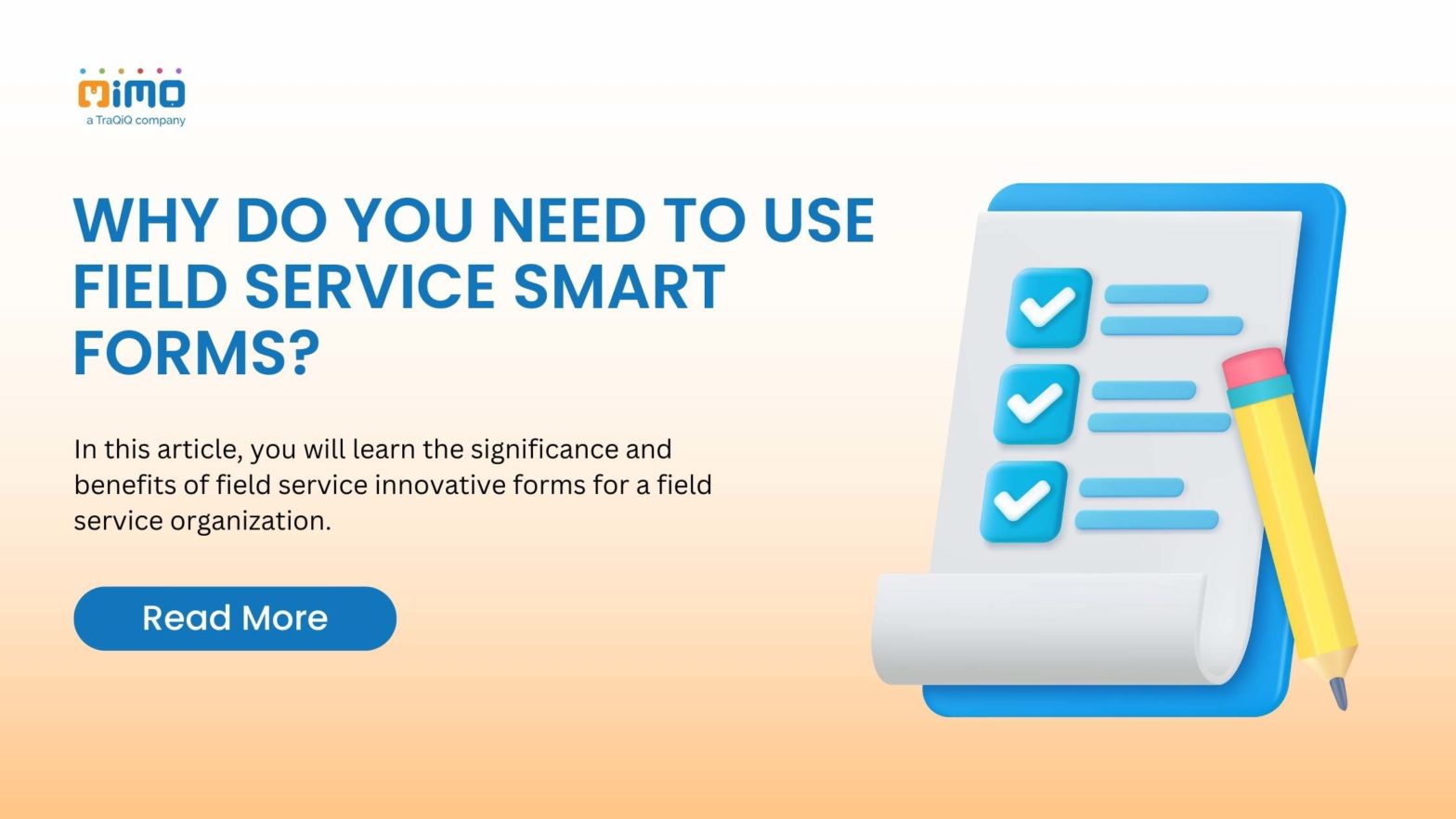
Why Do You Need to Use Field Service Smart Forms?
Field Service Smart Forms are the new and efficient way to edit non-spatial information regarding GIS features. Many field service organizations undergo digital transformation after realizing its importance. It provides high-accuracy GPS collection and location tracking.
In this article, you will learn the significance and benefits of field service innovative forms for a field service organization. However, start with the basics of smart forms to better understand their needs.
Table of Contents
What are field service smart forms?
Field Service Smart Forms are an essential feature of field service management software. The FSM designs smart forms for mobile devices so field technicians can use them more easily. It helps field technicians deliver better services.
The field service organization uses it to track their field technician’s work. They also use it for customer interactions, recording or initiating work orders, and collecting data on appointments.

Organizations use the software depending on their needs. Most FSM software features include offline mode, dispatching, and document scanning. It can also automate sending of forms, photos, and sketches.
How do smart forms work?
The FSM software developed the smart forms based upon existing, published web feature layers. The form is stored in the technician device’s map instead of creating another item.
The Smart Forms app designs dynamic smart forms and management tools. It is used to create guidelines and documentation for the service execution. The app offers a flexible, robust design interface. Its interface allows designers to assemble smart forms according to the field service organization’s needs.
The Smartforms app designer built it to make your organization more efficient. You can easily copy templates when you need adjustments for a new situation. It instantly changes its status so that you and your field service technician have up-to-date information.
How does it resolve the top challenges in the field service industry?
A field service organization faces many obstacles when not utilizing the Field Service Smart Forms. You may also face these challenges if you don’t use the field service smart forms app, including:
- An increasing amount of data collection: Most organizations are changing their traditional paper-based collection methods. The manual way of collecting data is not efficient and accurate. Now, organizations need data collection that is fast, easy, and accurate.
- Paper-based processes: In field service companies, technicians handle a large volume of printed paper. They must also ensure all PDF versions are correctly printed, scanned, and filled. It is hard for technicians to deal with paper-based processes; they need faster and more efficient means of processing.
- Time, accuracy, and efficiency: Often, technicians traditionally fill, manage, and share the form, but it is inefficient. It consumes more time and labor and is also prone to errors. It can affect workflow, revenue, and customer retention. Today, field service organizations need a more efficient, less time-consuming, and more accurate way to fill out the form.
Smart forms are solutions to all the above issues that a field service organization has to deal with.
What are the benefits of field service smart forms?
-
Improved workflow
It helps the field team complete their tasks quickly without having to print paper forms. It also eliminates the traditional way of filling papers, scanning, and entering data
-
Track with analytics
Smart forms furnish the analytical engine with proper live data without any errors. An organization can use it to gather data on the status of the consolidated customer profile and machines under annual maintenance contracts. Organizations can make data-driven decisions and improve their track record of performance with this relevant data.
-
Mobile agility
In today's world, everyone can easily access a mobile phone. Field techs using a field service smart form on their mobile phone help them increase their agility and efficiency while in the field. Consider software built for today's devices, including tablets, smartphones, and laptops.
-
Adoption
Organizations that are looking for digital transformation can use this software. It provides field service organizations with a robust and easy-to-deploy and adopts technology. It is easy to use, drag, and suitable for intuitive workflows.
-
Higher control and visibility
Field Service Smart Forms provide organizations with a high level of control and visibility. It helps your field service organization when working with a blended workforce.
-
Increase customer feedback
Nowadays, customers have great expectations of the services and businesses they choose. Field service organizations are also working to make their business more beneficial for their customers. However, they will need their customers' reviews and feedback to do so. Field service smart forms have feedback and online survey functionalities. It can help you get your customers' opinions, which will help you improve your services. It also helps with your business's revenue.
-
Auto-capture of the required information
It ensures that field service organizations get relevant information in convenient ways. Smart form designers create software that allows the setter to program certain fields to gather data automatically. It may extract data from various repositories or read from IoT sensors. It will enable field service agents to access the latest and most comprehensive data without much effort and time
-
Acquiring customer details
It captures updated customer details easily. Field service support agents can access these customers' information, like their social media accounts, during a chat. However, the smart form is the best source to get up-to-date information about the customer. Consider a brief form since most customers will drive away when seeing a lengthy form.
-
Better response
Field technicians find filling out a form much easier. It also motivates them to get started. The need to fill up a smart form prompts you to do the needful
-
Easy capture of information
The main benefit of smart forms is that they capture information in a structured manner. It also allows field service technicians to collect secure, intuitive, and straightforward data. The form setter may use different fields to capture the necessary data, causing each field to be assigned a specific format or range.
-
Improved collaborative capabilities
It increases the collaborative power of the data, meaning it helps field service distribute the forms. It enables you to share information for required tasks. It contains structured data that professionals verify to ensure it is relevant and free of error. They remove any form part that may lead to confusion and misunderstanding.
-
Regulatory compliance
The form allows field service organization authorities to capture the necessary information in the prescribed style and manner. It helps keep track of statutory obligations like regulatory filing. The back-end system automatically creates a report from the form particulars.
What are the things needed in a sound field service smart form software?
When creating a field service smart form software for your organization, you should consider some of its capabilities and features.
Data collection capabilities
Many field technicians face the problem of not having accurate and real-time data to finish their jobs. Technicians will need an easy method of data collection. You should ensure that the data is accessible to all other stakeholders within your organization.
Suitable for field service organizations

When looking for smart form software, ensure it is perfect for your field service organization. It would help if you avoided vendors that don’t have enough experience working with field service organizations.
You should also avoid those vendors that require you to modify the form of input slightly. Use only smart form software that is designed especially for field service use.
Part of an integrated solution
Having a field service smart form as an integrated field service management solution has many benefits. Its features help field technicians use other features in one app. Create software that is a part of unified, holistic, and integrated solutions. It allows field technicians to quickly complete their job without opening another program.
Adaption of smart forms
It would be best to consider software that dynamically changes according to user inputs. It helps your organization with other tasks, including workflow and diagnosis analysis
Intuitive interface and easy deployment.
Consider software that is integrated with existing systems and easy to deploy. The feature of intuitive interfaces will help new field technicians learn about software quickly. However, avoid investing in software that has too complex an interface.
In Conclusion
Partner with an excellent field service management software solutions provider. It will help you evaluate the right software.
MIMOIQ offers exemplary field service smart form software solutions for your organization. With this software, you can digitally transform your field service organization.
Like this article?
More To Explore

Elevating Internal Audit to Its Maximum Impact
+91 1141182211 Internal audit serves a critical role in ensuring accountability transparency. It is also well suited for enhancing good

Why is Internal Audit Important for Strengthening Banking Organizations?
+91 1141182211 IA procedures are the cornerstone of a robust banking system. They act as a powerful tool for banks

What are the Numerous Advantages of Auditing and Assurance Services?
+91 1141182211 Financial transparency, risk management, and improved internal controls are all crucial aspects of a healthy organization. But how









